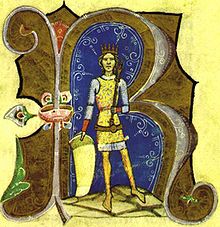Géza II of Hungary
King of Hungary and Croatia from 1141 to 1162 / From Wikipedia, the free encyclopedia
Dear Wikiwand AI, let's keep it short by simply answering these key questions:
Can you list the top facts and stats about Géza II of Hungary?
Summarize this article for a 10 year old
Géza II (Hungarian: II. Géza; Croatian: Gejza II.; Slovak: Gejza II.; 1130 – 31 May 1162) was King of Hungary and Croatia from 1141 to 1162. He was the oldest son of Béla the Blind and his wife, Helena of Serbia. When his father died, Géza was still a child and he started ruling under the guardianship of his mother and her brother, Beloš. A pretender to the throne, Boris Kalamanos, who had already claimed Hungary during Béla the Blind's reign, temporarily captured Pressburg (now Bratislava in Slovakia) with the assistance of German mercenaries in early 1146. In retaliation, Géza, who came of age in the same year, invaded Austria and routed Henry Jasomirgott, Margrave of Austria, in the Battle of the Fischa.
| Géza II | |
|---|---|
 The young Géza (from the Illuminated Chronicle) | |
| King of Hungary and Croatia | |
| Reign | 13 February 1141 – 31 May 1162 |
| Coronation | 16 February 1141 |
| Predecessor | Béla II |
| Successor | Stephen III |
| Regent | Helena of Serbia |
| Born | 1130 Tolna, Kingdom of Hungary |
| Died | 31 May 1162 (aged 31–32) Székesfehérvár,[1] Kingdom of Hungary |
| Burial | |
| Spouse | Euphrosyne of Kiev |
| Issue more... | |
| Dynasty | Árpád |
| Father | Béla II of Hungary |
| Mother | Helena of Serbia |
| Religion | Roman Catholic |
Although the German–Hungarian relations remained tense, no major confrontations occurred when the German crusaders marched through Hungary in June 1147. Two months later, Louis VII of France and his crusaders arrived, along with Boris Kalamanos who attempted to take advantage of the crusade to return to Hungary. Louis VII refused to extradite Boris to Géza, but prevented the pretender from contacting his supporters in Hungary and managed to shepherd him to Constantinople with the rest of the crusaders. Géza joined the coalition that Louis VII and Roger II of Sicily formed against Conrad III of Germany and Byzantine emperor Manuel I Komnenos.
Géza intervened at least six times in battles for control of Kiev on behalf of Iziaslav II either by sending reinforcements or by personally leading his troops to the Kievan Rus' between 1148 and 1155. He also waged war against the Byzantine Empire numerous times on behalf of his allies, including his cousins who ruled over Serbia, but could not prevent the Byzantines from restoring their suzerainty. Conflicts eventually emerged between Géza and his brothers, Stephen and Ladislaus, who both took flight from Hungary and settled in Emperor Manuel's court in Constantinople. Géza supported Frederick I between 1158 and 1160, against the Lombard's by providing auxiliary troops. After the cardinals who supported Emperor Frederick I elected Victor IV as pope, Géza acknowledged his legitimacy in 1160, but within a year he had changed sides and concluded a concordat with Victor IV's opponent, Pope Alexander III. Before his death, Géza organized a separate appanage duchy for his younger son, Béla.
The ancestors of the Transylvanian Saxons came to Hungary during Géza's reign. Western European knights and Muslim warriors from the Pontic steppes also settled in Hungary during this period. Géza supposedly even allowed his Muslim soldiers to take concubines.
Oops something went wrong: